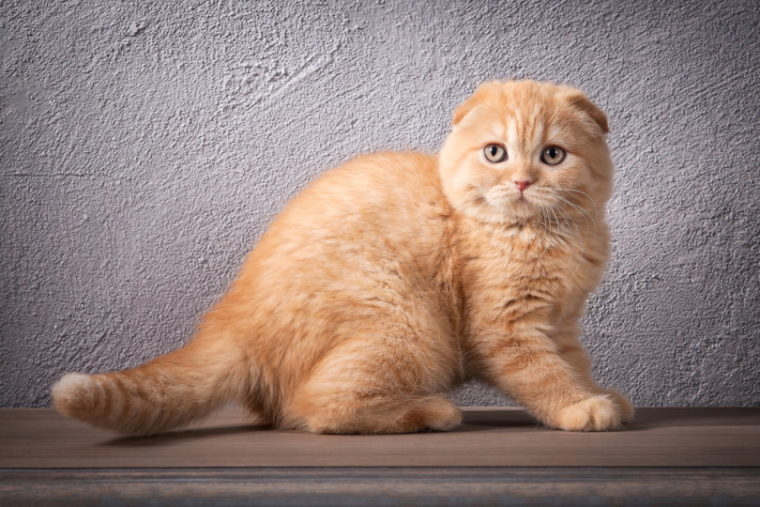
Recognized by their distinctive folded ears, the Scottish Fold is a popular cat for their cute appearance. The genetic mutation that causes their adorable ears, however, also leads to several severe health issues.
Beyond their appearance, the Scottish Fold is one of the most people friendly and calm cats that you can get. They’re loving and adoring of their people and make a great companion for all sorts of families. These traits endear them to many people despite the ongoing discussions about the morality of breeding them.
Whether you own one of these cats already or want to learn more about their health before researching breeders, this guide will introduce you to the common health problems facing the Scottish Fold.
The 5 Health Concerns for Scottish Fold Cats
1. Osteochondrodysplasia
Scottish Folds are well known for their cute, folded ears. While this trait gives them a unique appearance, it’s actually the result of a genetic mutation that affects the development of cartilage in the ears. This mutation not only gives these cats their unique appearance but also causes one of the biggest health problems for the breed.
Osteochondrodysplasia is a disorder that is characterized by abnormalities in the development of bone and cartilage. Unfortunately for your Scottish Fold, it’s an incredibly painful disease and isn’t curable. It can be treated with drugs or surgery in extreme cases. Since there is no cure for the disease, treatment is an ongoing necessity for the lifetime of your cat.
Unlike many other cat breeds that can be screened for common health issues, osteochondrodysplasia is unavoidable for Scottish Fold cats with folded ears. It can develop in Scottish Fold cats as young as 7 weeks old.
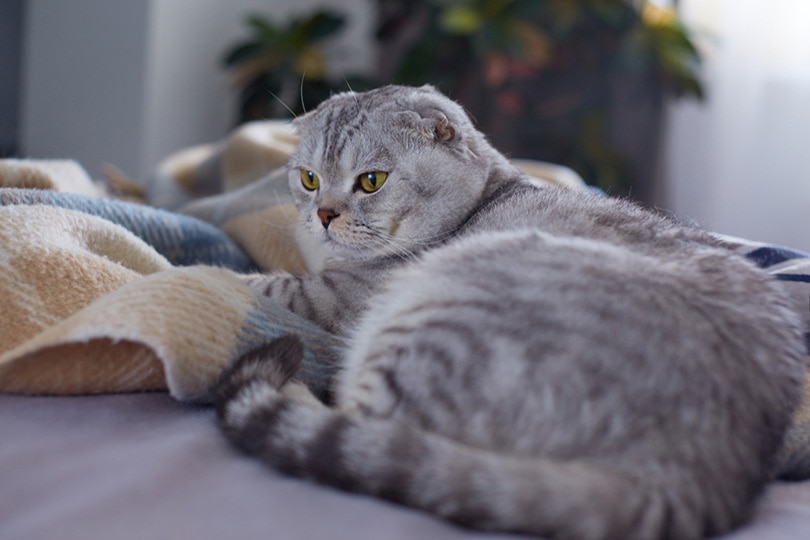
2. Arthritis
Due to the inevitable development of osteochondrodysplasia, Scottish Fold cats are prone to developing other degenerative joint diseases too. Arthritis is one of the most common and can further interfere with your cat’s ability to get around. Like osteochondrodysplasia, arthritis isn’t curable but can be treated with pain medication and anti-inflammatory drugs.
Many of the symptoms of arthritis are similar to osteochondrodysplasia. Both conditions can result in reduced activity levels, irritability, stiffness, limping, and reluctance to jump on or off furniture.
3. Cardiomyopathy
Heart disease is a common disease that affects many cat breeds. Cardiomyopathy is caused by the heart muscle becoming too thin or too thick to work correctly. Both issues can lead to congestive heart failure, blood clots, and sometimes, sudden death.
It can be caused by genetics, scar tissue inside the ventricle, or a lack of taurine in your cat’s diet.
Many heart conditions have similar signs, and an accurate diagnosis requires an echocardiogram. Like with the other health conditions common to the Scottish Fold, with proper treatment, your cat can live for several years.
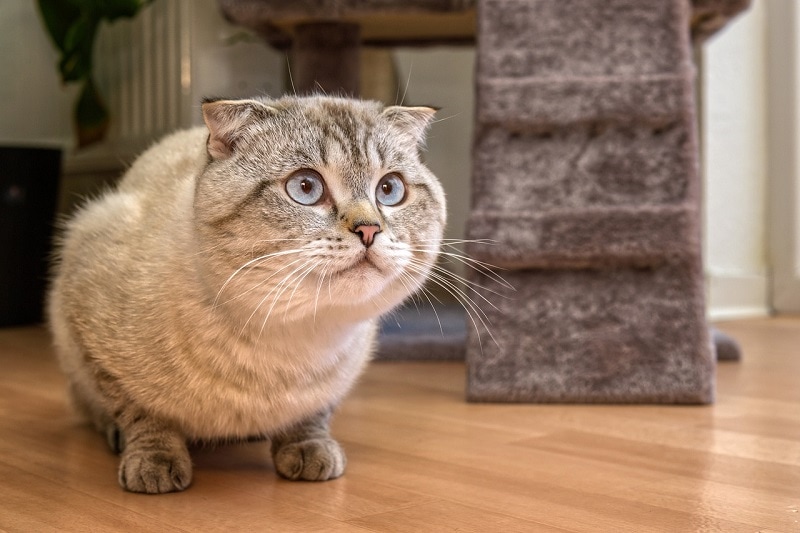
4. Obesity
As predators and descendants of wild animals, cats don’t like to show when they’re in pain. While they might protest more when you try to move them if they’re not feeling well, they’re more likely to curl up and nap more often until they feel better.
Since the Scottish Fold is so susceptible to osteochondrodysplasia and can spend most of their lives in pain, they’re generally one of the least active cats around. This tendency to not want to move leads to the development of obesity, especially if their diet isn’t adjusted to take into account their limited activity levels.
5. Polycystic Kidney Disease (PKD)
A genetic condition, PKD causes pockets of fluid, or cysts, to form in the kidneys. They’re present from birth and steadily grow larger until they begin to interfere with how the kidneys function. This interference often leads to kidney failure.
Not all cats have the same number of cysts or are at risk of developing kidney failure until much later in life, if at all. Due to how differently PKD affects different cats, it’s hard to say how severe the disease will be for your Scottish Fold.
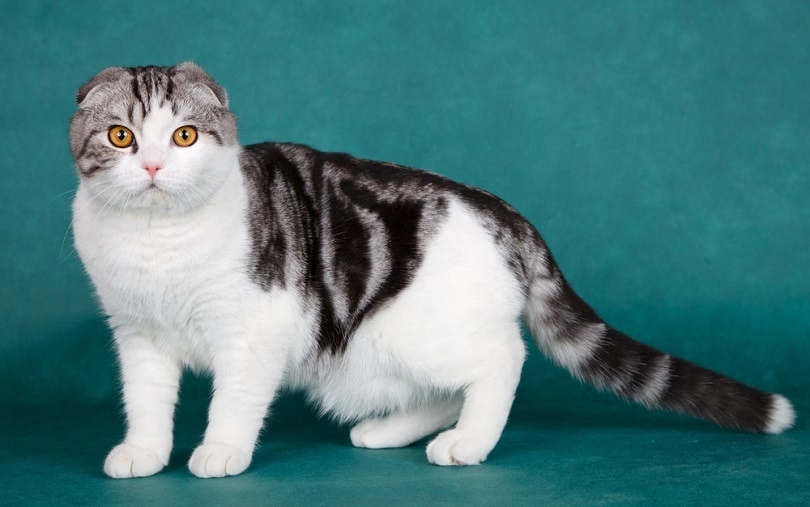
What Are Scottish Fold Cats?
Originating in Tayside, Scotland, the Scottish Fold started with a barn cat. Susie, a dedicated mouser, caught the attention of a shepherd called William Ross in 1961. Her folded ears drew his eye, and he later adopted one of her kittens, called Snooks, which helped develop the Scottish Fold that we know today.
Is It Cruel to Have a Scottish Fold Cat?
There are two types of Scottish Fold. One has straight ears like other cat breeds, and one has folded ears. While the former is relatively healthy, the defect that causes the latter’s folded ears leads to a lifetime of pain for these cats.
This chronic pain makes many cat lovers reluctant to continue breeding the Scottish Fold. The breed was developed solely for their cute appearance. As a result, their health needs fell to the wayside.
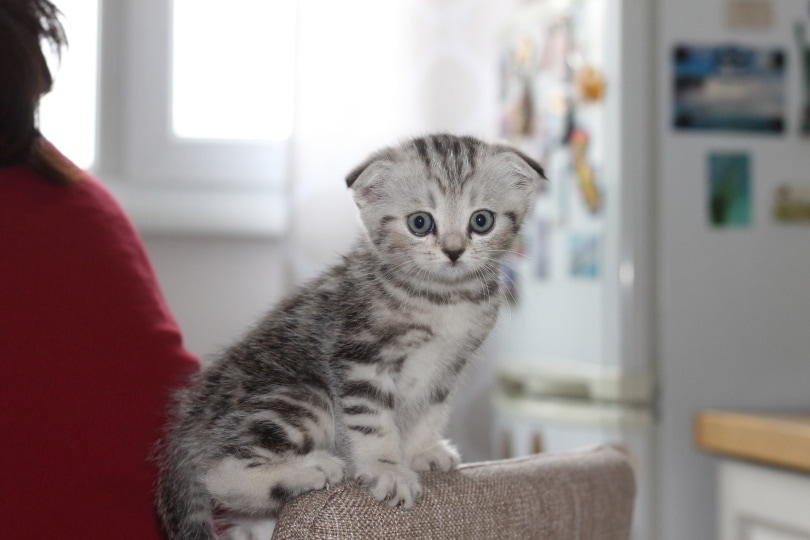
In an attempt to stop the inevitable suffering, Scottish Fold cats have been banned by the Fédération Internationale Féline and removed as a registered breed by the Cat Fancy of Great Britain. A few breeders in the U.S.A. have attempted to breed out the issue by only breeding Scottish Folds with American Shorthairs and British Shorthairs. While this has led to the healthier, straight-eared variety, pairings can still result in kittens with folded ears due to it being the dominant gene.
The consensus for many cat lovers is that a cute appearance should never take priority over the welfare of the cat themselves. This makes it incredibly difficult to justify the continued breeding of the Scottish Fold even when crossed with breeds that don’t have folded ears.
With a careful treatment plan, these cats are capable of living for a long time, but this is dependent on how the disease affects them in the first place. Many Scottish Folds must be euthanized early on in their lives.
Conclusion
As adorable as they may be, the Scottish Fold is a breed widely debated among the cat lover community due to the inevitable suffering that the breed faces because of the genetic traits that cause their folded ears.
While osteochondrodysplasia is the life-changing and incurable health issue facing this breed, they’re also susceptible to a few other common health risks. We hope that this guide has helped you to better understand the issues facing this breed.
Read Reads:
- 200+ Scottish Fold Cat Names: Fun & Unique Options For Your Kitty
- Is a Scottish Fold Hypoallergenic? Facts & FAQ
Featured Image Credit: dien, Shutterstock








